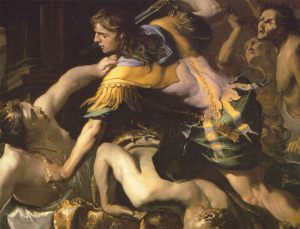Who was Aegisthus in Greek Mythology

It was said that this union was the result of rape, and indeed on Athena’s altar while Pelopia was performing a sacrifice, as Thyestes had received an oracle that revenge would come from a son he would have by incest. At the time of the rape his sword fell, or Pelopia snatched it from him.
In both versions Pelopia kept the sword and gave it to her son as something that could help identify father and son later, which it did. Another version of the myth has it that the union of father and daughter took place without one knowing the identity of the other.
While Pelopia was still pregnant, Atreus married her without knowing her identity. In the version that wants the union to be the result of rape, the mother abandoned the infant as soon as it was born on the mountain, where a goat fed it with her milk, which is why the shepherds named the child Aegisthus. According to another version, the union took place, the identity of the two lovers being unknown, in the palace of King Thesprotos. In another version, the child grew up in the palace as the king’s stepson.
Atreus asked his sons, or Aegisthus, to find Thyestes for him and bring him to Mycenae. There he imprisoned him and had Aegisthus kill him; but Thyestes and Aegisthus were soon recognized as father and son by the sword with which the son was about to kill the father, and which was the sword that fell from Thyestes, or his snapped Pelopia, at the time of the rape.
In fact, they also invited Pelopia, and then Thyestes revealed to her and Aegisthus their true identity and the ties of kinship that united them. Pelopia grabbed the sword and killed herself. With this blood-soaked sword Aegisthus sought out Atreus who found him making thanksgiving sacrifices to the gods for the death of his brother, whom he thought had been executed. He killed him, exiled the two young Atreids Agamemnon and Menelaus and reigned with his father in Mycenae.
While the Trojan War was raging, Aegisthus set out to charm Clytemnestra. For some time after Agamemnon’s departure, Clytemnestra remained faithful to him. Besides, the husband had planned to leave the Aedian Demodocus beside her, her advisor and his informant.
She, however, quickly succumbed to the siege of Aegisthus, perhaps because she had been informed of her husband’s relationship with Chryseis, perhaps out of revenge for the sacrifice of Iphigenia, perhaps out of an exhortation by Nauplius who had made it his life’s purpose to corrupt the women of Greek generals, in order to avenge the death of Palamedes’ son.
Clytemnestra and Aegisthus remained together until the return of Agamemnon, when, according to one version of the myth, she avenged the death of his brothers by Atreus by pretending to kill Agamemnon, son of Atreus
Indeed, on the return journey after the fall of Troy, Agamemnon suffered greatly. He delayed starting from Troy in order to propitiate, in vain, the goddess Athena for the devastation caused by the Achaeans to the shrines of the gods. With favorable weather he departed from Troas, arrived at Tenedos and from there set sail for Evia.
At Kaphireas many ships sank and many Achaeans were drowned by an unexpected storm. Thanks to the favor of Hera, Agamemnon and his ships were saved. But a storm drove him to Kythera, where Thyestes once reigned and now his son and lover of Clytemnestra Aegisthus, who at that time was in Mycenae and was informed of Agamemnon’s return by a sentry stationed on a hill.
Thus, before Agamemnon could learn anything about his kingdom, Aegisthus welcomed him and invited him to his house for a banquet. There he murdered him, along with twenty of his followers, while Clytemnestra, hidden at the time of the murder, appeared and killed Cassandra with a sword, whose body remained buried and naked in a stream next to Agamemnon’s tomb.
